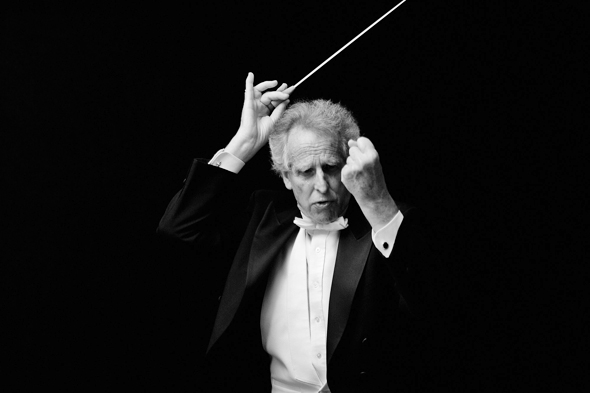Zander, Boston Phil offer a mixed Mahler Sixth

Benjamin Zander led the Boston Philharmonic in Mahler’s Symphony No. 6 Thursday night at the Sanders Theatre.
Any performance of Mahler’s Symphony No. 6, subtitled “Tragic,” has the chance to move, to disturb, to enlighten, and to change. Benjamin Zander’s Boston Philharmonic aspired to all these things Thursday evening at Sanders Theatre, achieving some but only hinting at others.
The concert was part of Zander’s Discovery Series, meaning a lengthy monologue about the work, with orchestral examples, preceding the performance. Nobody loves a microphone like Zander, and his discussion focused on creating an understandable structure for the hour-and-a-half of music that followed. Generally he succeeded.
Zander lectured about musical elements, but only as they created emotional impact: “Alma’s theme,” Mahler’s tribute to his wife that recurs in the first movement; the cowbells, which recall the composer’s Alpine retreat; the subtle shifts from major to minor in the horns, portents of the tragedy to come; and of course, the three fateful hammer blows, here realized with a homemade instrument of wood and pipe. Avoiding the textural and historical controversies that surround the work, Zander brought Mahler’s emotional investment in the Sixth to the surface.
Zander’s enthusiasm is always genuine, and his emotional comments enthused his audience. But for all the genuine passion he brings to talking about his subject, Zander seemed curiously detached when he took up the baton as opposed to the microphone. There were certainly musical highlights, but orchestra and conductor spent far too much of this performance merely reading the notes as opposed to infusing them with life.
Balance was an issue, not helped here by musicians packed elbow to elbow on the stage. The first movement, Allegro energico, in classic sonata form, had the energy, but not the shifting tempos and articulated dynamics necessary to hold interest. A respite from the wave of sound came when concertmaster Joanna Kurkowicz led an elegant duo with the horns, calming the proceedings briefly. Another section, a brief phrase before the long repeat, where Mahler calls for the strings to play “bouncing” (“spring-bogen”), had real freshness. Otherwise, Zander read his score, interacted little with his players, and they returned the favor.
It meant regular downbeats, and few missed entrances, but inattentive phrasing. Zander’s tempo in the Scherzo (played second here, with the Andante third; Mahler was indecisive about the order, and Zander followed the generally accepted contemporary practice), had a snap to it, and the ferocious elements of the music did stand out. Sections of otherworldly musical color, mainly an admixture of off-kilter horns and percussion, let listeners know something untoward approached. This Zander brought off with aplomb. An elegant oboe solo (Peggy Pearson) served as counterpoint to the musical anger, and the Scherzo was by far the most successful section of the performance.
The Andante brought lushness and emotional relief, but like much of the evening’s playing overstayed its welcome by not creating enough dynamic contrast. A horn solo (Neil Deland) stood out for its clarity, a bright spot in an otherwise bumptious evening for the brass, required to play through multiple exposed sections in this score.
The finale had fitful life, and Zander’s earlier comments, suggesting the audience focus on the music leading up to and falling away from the three stupendous hammer blows, helped concentrate attention. Still, despite the movement’s length, an arc of a phrase, a bit of lingering over the cowbell section (the bells were placed in the balcony, to create Mahler’s “in the distance” requirement, but still sounded too regular and too loud)—any alteration of the headlong run through the score, something to bring out the great ambiguities in Mahler’s music—would have been welcome.
The program repeats 8 p.m. Saturday in Jordan Hall and 3 p.m. Sunday in Sanders Theatre. bostonphil.org
Posted in Performances



